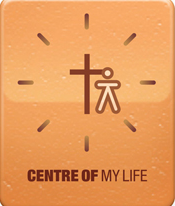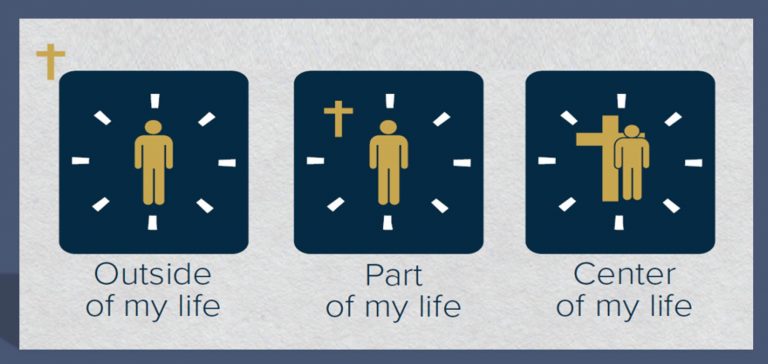Let’s begin with a question: What would make the rest of today perfect? What would make the rest of today perfect? If we got a good night’s sleep, had a beautiful dinner, prayed more, if people treated us better, if we finished everything we need to get done?
The human heart is designed for perfection. So, let’s tell Jesus what we desire: ‘Jesus, we want a better day; help us to spend more time with You, to love You and others better. If it’s according to Your plan, could You also give us more rest today, no arguments? And, I know it’s October, but, if tomorrow could be a snow day so that we don’t have to go to work, Thy will be done.’
“As Jesus was setting out on a journey, a man ran up and knelt before him,” (Mk 10:17). St. John Paul II taught that this rich man represents every person who, consciously or not, approaches Jesus about the full meaning of life, happiness, and perfection (Veritatis Splendor, 7). To seek happiness is actually a religious quest. And so the man asks, “Good Teacher, what must I do to inherit eternal life?” Notice that he wants to know what he has to do, because he knows that happiness not only comes from what God does, but entails our response. In the same way, to have a perfect day, we must do what’s right.
“Jesus said to him, ‘Why do you call me good? No one is good but God alone’” (10:18). If no one is good but God alone, then Jesus is asking if the man believes Him to be God, if he trusts Him and His teachings.
In six weeks, we have our Christ the King Challenge, and, using the Relationship Diagram of CCO, we see that there are three fundamental ways to relate to Jesus: He can either be outside of our lives, a part of our lives, or the centre. A question to ponder is: Which of these relationships leads to the fullness of life and happiness?
Jesus continues: “You know the commandments: ‘You shall not murder; You shall not commit adultery; You shall not steal; You shall not bear false witness; You shall not defraud; Honor your father and mother’” (10:19). Jesus is teaching that His commandments are part of the path to eternal life. Let’s go through each.
Would life be better if we didn’t murder? Yes. This is the Fifth Commandment, about respect for life and the common good.
In the Church’s teaching, civic responsibilities fall under this heading. This Saturday, Oct. 19, 2024 we have our B.C. Provincial election, and, as we’ve mentioned before, for Catholics, it’s a moral obligation to vote because it’s so easy and can do so much good. The B.C. Catholic newspaper has a link to catholicconscience.org which outlines the Church’s teachings on moral issues and has a party Platform Comparison [Voting-Like-a-Catholic-2024BC-1] They simply list what each party advocates, so that we can make informed moral decisions.
Next, would life be better if we didn’t commit adultery? Yes. What I’m proposing is that, if we were to make Jesus the centre of our lives, our lives would be happier. They won’t be easier because we have to take up Jesus’ Cross and follow Him; I’m only saying they’ll be happier and we’ll have a peace that will fill our souls. For example, Jesus’ teaching on adultery protects us from making a big mistake. Everyone who’s committed this sin regrets it deep down. I wish they would go to Jesus for forgiveness and the renewal of life. Every sin can be forgiven because Jesus loves us and died for us.
Based on the Bible, most of us know that sex before marriage is wrong, but I never knew until last year that there are lots of studies on regret after casual sexual relationships. Think about that: No one ever says, ‘I’m such an idiot, I should have had more sex when I was young.’ On the contrary, usually we say, ‘I shouldn’t have done that.’ With regard to Confession, it’s the opposite: No one ever regrets having gone to Confession. Actually, after going, we think, ‘I feel so good. I feel so free. I feel loved.’
Going back to Jesus’ teaching, life is better when we don’t steal. And who has the better marriage or friendship: Two people who regularly lie, sometimes lie, or never lie? And it goes without saying that our families are happier when there’s more respect.
The rich man replies: “Teacher, I have kept all these since my youth.’ Jesus, looking at him, loved him and said, ‘You lack one thing; go, sell what you own, and give the money to the poor, and you will have treasure in heaven; then come, follow me’” (10:20-21). This is how Jesus looks at every human person no matter what sins we’ve committed: with love; He was probably smiling, because, when we think about the people we love and how much we love them, we smile. Yet, the man lacks one thing: ‘come, follow me.’ Jesus is inviting the man to make Him the centre of his life.
 Think about the Relationship Diagram from Jesus’ point of view: Where has Jesus placed us in His life: outside of His life, a part of it, or the centre? When He died on the Cross for us, He made us the centre. So, when Jesus invites us to make Him the centre, it’s in response to His making us the centre.
Think about the Relationship Diagram from Jesus’ point of view: Where has Jesus placed us in His life: outside of His life, a part of it, or the centre? When He died on the Cross for us, He made us the centre. So, when Jesus invites us to make Him the centre, it’s in response to His making us the centre.
“When he heard this, he was shocked and went away grieving, for he had many possessions. Then Jesus looked around and said to his disciples, ‘How hard it will be for those who have wealth to enter the kingdom of God!’” (10:22-23). ‘Possessions’ and ‘wealth’ refer to anything that prevents us from loving Jesus. We become afraid of losing these possessions if we follow Jesus. The most common fear, and it’s the biggest lie ever, is that Jesus is going to make us less happy.
When Jesus invited me to consider entering the seminary in Grade 12, I couldn’t tell anyone at the time, but I was afraid of missing out on high school graduation, the final party of the year. But Jesus was patient and gentle with me, and helped me trust Him more and more. “They were greatly astounded and said to one another, ‘Then who can be saved?’ Jesus looked at them and said, ‘For mortals it is impossible, but not for God; for God all things are possible’” (10:26-27). If there’s a part of us that wants to make Him the centre but a part of us is holding us back, ask Him for the grace to get there—that prayer is a sign of great love and trust on our part.
To return to our original question about making the rest of today perfect, perhaps if we try making Him the centre of one day, see what happens. I believe we’ll have clarity: Jesus loves me; I am loved perfectly and taken care of. Everything that happens to me now has a purpose: my suffering is allowed so that I love more; I’m going to do everything for Him. I’m going to do what I need to do: I’m going to bed early, eat healthily, love my family more, and, because Jesus is with me, I’m going to tackle that one thing I’ve been avoiding.
“Truly I tell you, there is no one who has left house or brothers or sisters or mother or father or children… for my sake… who will not receive a hundredfold now in this age — houses, brothers and sisters, mothers and children… with persecutions — and in the age to come eternal life’” (10:29-30). Jesus says that, if we make Him the centre, we will receive ‘a hundredfold,’ but there is a sacrifice, meaning our love will be tested—that’s why He says there will be ‘persecutions.’ However, notice that He says that we give up ‘house, brothers, sisters, mother, father, children,’ but then we receive them back, meaning, when we love Jesus most, we love our family not less, but more. And the best part is now we possess eternal life.


